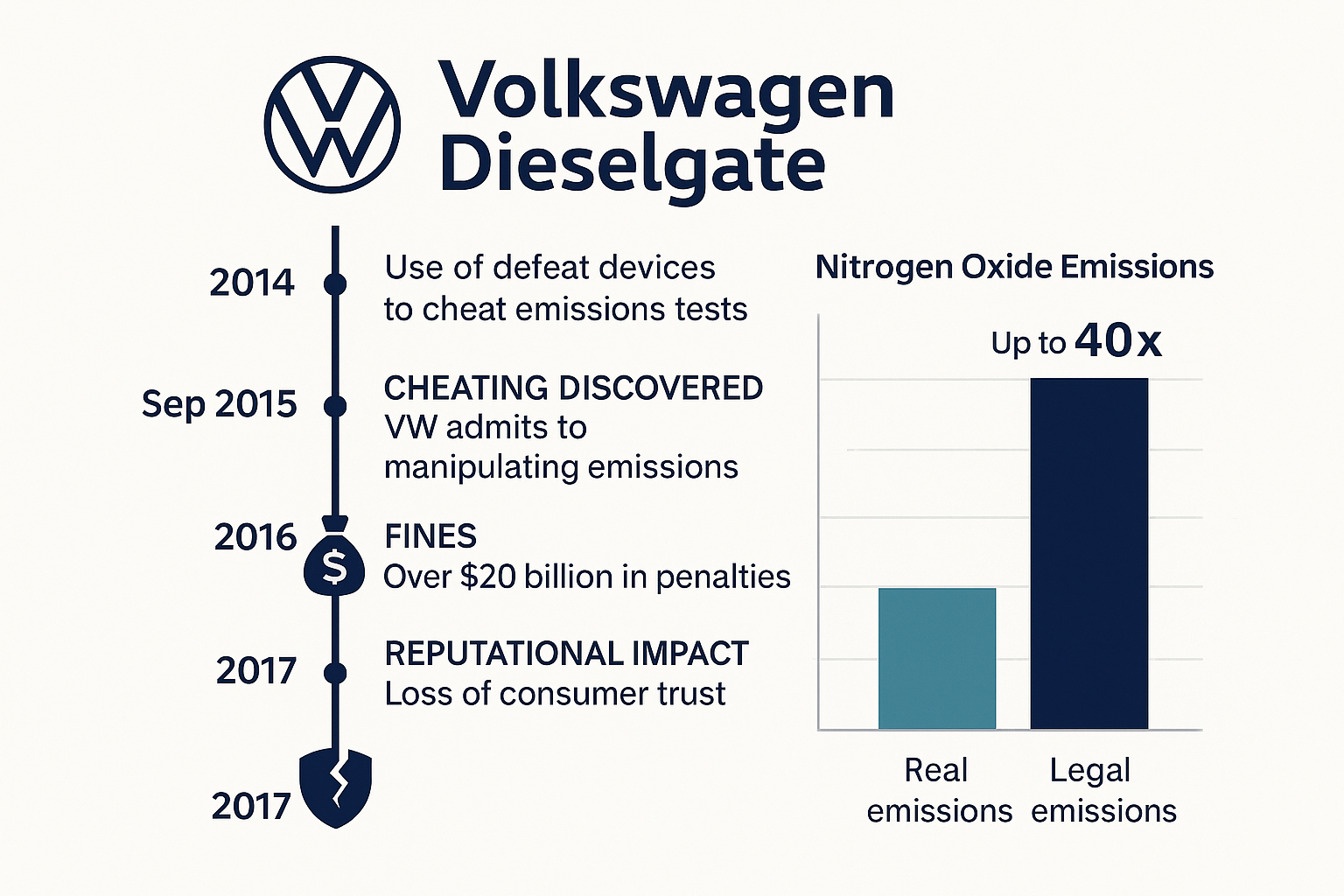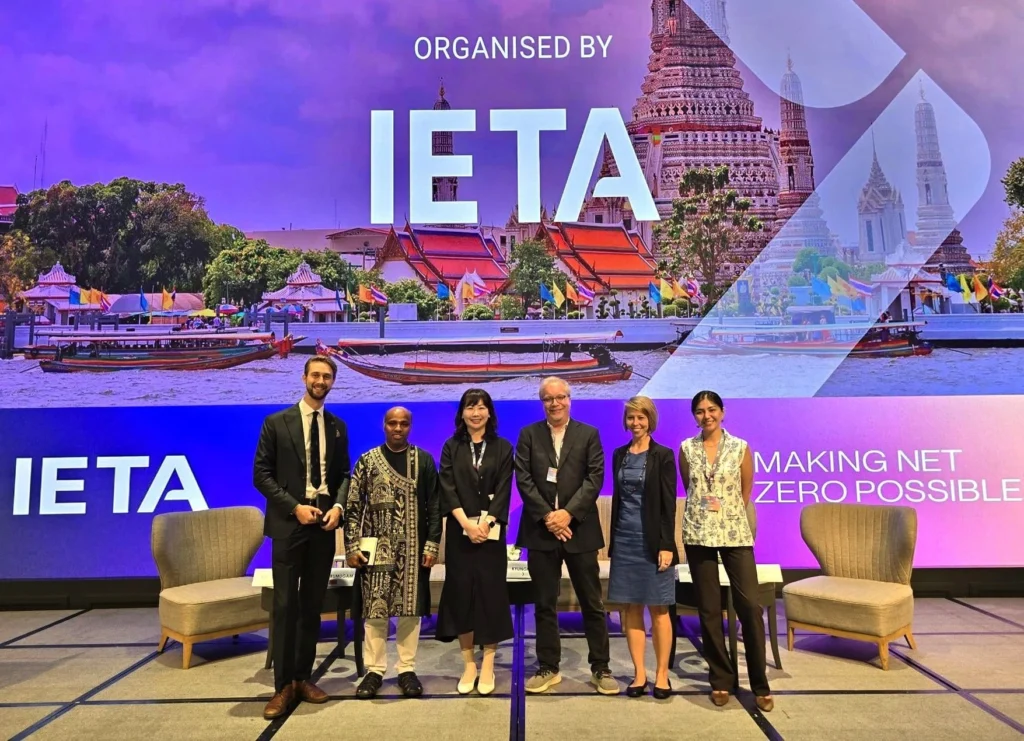Crisis of Trust
In today’s climate crisis, our biggest barrier isn’t just carbon emissions. It’s a crisis of trust. Trust in data, in institutions, and critically, in corporate claims. The rise of greenwashing, the practice of making misleading environmental claims without real action, is undermining global sustainability efforts.
Dieselgate: A Case Study in Trust Collapse
One of the most glaring examples of greenwashing was Volkswagen’s “Dieselgate” scandal in 2015. The company used software to cheat emissions tests, with real nitrogen oxide levels reaching up to 40 times the legal limit. Volkswagen paid billions in fines and suffered lasting reputational damage.

But the crucial question is: Why would a global automotive leader cheat?
Research indicates immense pressure to meet aggressive market and financial targets played a pivotal role. Top executives, including former VW CEO Martin Winterkorn, were directly involved or informed. Winterkorn breached his fiduciary duty, failing to act transparently or swiftly, leading to charges of organized commercial fraud and market manipulation.
Volkswagen aimed at becoming the world’s largest automaker, aggressively marketing diesel as a cleaner alternative, especially targeting markets like the United States. In hindsight, consider this:
“What could have been different if Volkswagen had access to robust carbon tracking systems and accurate, verified Scope 3 reporting frameworks that exist today?“
The Trust Gap in Climate Reporting
Today, corporate net-zero pledges often lack credibility, primarily due to unverified and incomplete reporting. The gap between ambitious climate targets and transparent, verifiable actions remains enormous.
Consider Scope 3 emissions—those indirect emissions arising from consumer activities such as product use, disposal, and transportation:
- According to McKinsey, Scope 3 typically represents up to 90% of total emissions for many industries.
- Yet, an IBM report found that only 38% of businesses accurately measure their Scope 3 footprints.
This lack of reliable data isn’t merely an accounting issue; it’s a trust infrastructure failure. Without clear visibility, reliable verification, and adequate rewards for everyday sustainability actions, we can’t expect genuine progress.
Volkswagen itself acknowledges the majority of its emissions arise from the use of its vehicles by consumers—yet like many companies, it still struggles to effectively track or verify this impact.
Invisible Actions, Visible Impact
The environmental benefits of everyday actions such as reusing, sharing, walking, and borrowing are meaningful but remain invisible and unrewarded in most reporting frameworks. This lack of visibility hinders adoption and prevents sustainable practices from scaling.
Data gaps also undermine progress toward the Sustainable Development Goals (SDGs). Over 68 percent of SDG indicators lack sufficient data, making it difficult to monitor progress or guide investment. As UNEP Chief Statistician Jillian Campbell notes, “The lack of data has also corresponded to a lack of investment toward achieving the environmental dimension of the SDGs.” (Campbell, 2023)
The Call for Verified Trust
Trust is foundational for scaling meaningful climate action. Without transparent and independently verified data, ESG claims remain fragmented, inconsistent, and susceptible to manipulation. Only through verifiable trust can we ensure equitable outcomes, mobilize investment, and foster genuine collaboration.
The Inevitable Shift: ISSB and Organizational Change
Emmanuel Faber, Chair of the ISSB, has emphasized that the fragmentation and inconsistency of sustainability data present major challenges for CFOs. This makes it difficult for them to produce reliable disclosures and support sound decision-making alongside financial reporting.
Faber highlighted the complex “alphabet soup” of current sustainability standards a term referring to the overwhelming number of different frameworks and guidelines, such as GRI, SASB, TCFD, CDP, and CDSB. This multitude of standards creates a fragmented landscape and a heavy reporting burden for companies, making consistent, comparable, and reliable sustainability reporting a major challenge. The ISSB’s mission is to establish a global baseline to reduce this fragmentation, improve comparability, and provide decision-useful sustainability information.
He also stressed the growing need for collaboration between Chief Sustainability Officers (CSOs) and CFOs, as sustainability data becomes increasingly integrated with financial disclosures. Bridging this gap is essential to produce credible and trusted information that meets the expectations of investors and regulators. (International Federation of Accountants (IFAC),2024)
Building a Solution: Carbon Wallet
That’s why I’m developing Carbon Wallet, a platform designed to help individuals and businesses truly own their carbon impact, not through mere claims, but with verifiable, transparent data.
By capturing, verifying, and rewarding previously invisible actions, Carbon Wallet aims to close the trust gap, enabling accurate Scope 3 reporting, robust accountability, and genuine environmental impact.
Invitation to Engage
To rebuild climate trust, we need bold, open conversations. I’d love your insights:
- What makes a climate solution genuinely trustworthy to you?
- Which aspects of climate action remain invisible where you live or work?
Let’s begin building a trustworthy climate future today.
“It’s time to own your carbon.“

